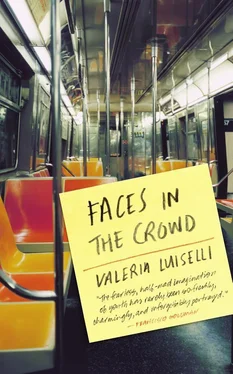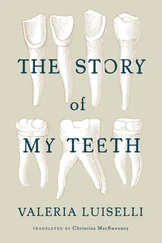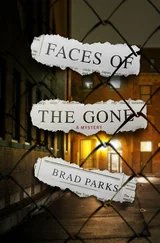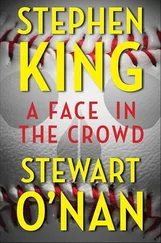*
A horizontal novel, told vertically. A novel that has to be told from the outside in order to be read from within.
*
Naturally, there are a lot of deaths in the course of a lifetime. Most people don’t notice. They think you die once and that’s it. But you only have to pay a bit of attention to realize that you go and die every so often. That’s not just a poetic turn of phrase. I’m not saying the soul this and the soul that, but that one day you cross the street and a car knocks you down; another day you fall asleep in the bathtub and never get out; and another, you tumble down the stairs of your building and crack your head open. Most deaths don’t matter: the film goes on running. Except that that’s when everything takes a turn, even though it may be imperceptible, and the consequences are not always apparent straight away.
I began to die in Manhattan, in the summer of 1928. Of course, no one except me noticed my deaths — people are too busy with their own lives to take note of other people’s little deaths. I noticed because after each death I got a temperature and lost weight.
I used to weigh myself every morning, to see if I’d died the day before. And though it didn’t happen all that often, I was losing pounds at an alarming rate (I never knew how much it was in kilos). It’s not that I got any thinner. I just lost weight, as if I were hollowing out, while my shell remained intact. Now, for instance, I’m fat and have man boobs, but I scarcely weigh three pounds. I don’t know if that means I’ve got three deaths left, as if I were a cat counting backwards. No, I don’t think so. I think the next one will be the real thing.
*
Dakota and I visited the cemetery near her house in Queens. We went to leave a bunch of flowers for Lucky Luciano, a mafioso to whom she claimed to be distantly related. Luciano had been stabbed in the face in 1929, and was left with a squint in one eye. Dakota described the scene to me with almost literary precision as we were making our way down the long cemetery paths lined with photographs and white lilies. Three men had forced him into a limo at gunpoint and destroyed his face with a knife, but made sure he was still alive. They dumped him on a beach on Long Island. Lucky Luciano walked to the nearest hospital, covering the socket of his injured eye with his hand. The story seemed to me more hilarious than tragic, despite all Dakota’s efforts to move me. After searching for his grave for a while, we came across Robert Mapplethorpe’s. Dakota had an attack of mock nostalgia and wanted to stop for a moment. She requested silence. I’d never liked Mapplethorpe’s photos, but I condescended to sit with her in the sun, one on either side of the gravestone, like two premature effigies of Patti Smith. After a few minutes a white cat appeared from among the bushes and prostrated itself in Dakota’s lap. That seemed to her a sign of something, and perhaps she was right. She wanted to take it home. I tried to dissuade her, because cemetery cats never get used to the company of the living, but Dakota took no notice. We left Mapplethorpe the flowers we’d brought for poor old Lucky Luciano and went to buy cat food.
*
Salvatore was having a party. Come with your friends, he said. He was in an overexcited, celebratory mood, preparing for his seventieth birthday. He reviewed the menu with me, over and over: pork stuffed with pomegranate seeds, salad with cashew nuts and goat’s cheese, white rice with coconut milk. I brought Dakota, who brought the new cat and her ex-boyfriend; I brought Moby and Pajarote; I called White, who didn’t turn up; I brought Salvatore back his record player. His friends also arrived, in a painfully slow trickle. A woman who’d been a ballerina and was still displaying her collarbones and pulling in her abs, as if this would heal the blow of so many years without leotards and tutus; an elderly entomologist who mated fruit flies in a laboratory; a young girl, Salvatore’s student, who was trying to score points with the birthday boy.
We ate around an oak coffee table, covered in papers, in the center of the living room. We listened to records while gently touching legs and shoulders, lounging on the couch or the floor, generating false hopes of the degenerate orgy that never occurred. Salvatore talked for hours about the erection of a young Neapolitan guy he’d seen on a nudist beach when he was seventeen. While we were chewing pieces of pork, he made some reference to a movie by a Portuguese director, whose name I can never remember, in which someone is nibbling a pomegranate. Apparently, it was an erotic scene. One of the guests threw up in the kitchen. Dakota’s cat ate the vomit. The entomologist took the baton, speculating about the relationship between the quantity of sugar in the fruit and the reproductive cycles of the flies. Salvatore’s student sat on the back of the armchair, behind him, and demonstrated the principal points of Thai massage while commenting on how sad it was that the Australian shark was in imminent danger of extinction. Pajarote fell asleep on Dakota’s lap. She was singing something by Bessie Smith and stroking the head of her ex-boyfriend, who was sitting on the floor, rubbing his foot against mine while leafing through the papers Salvatore had laid out on the table in staged disorder, specially for that night, the night of his birthday.
Anyone for coffee? asked the birthday boy, after a long silence.
Several hands were raised.
Salvatore left the living room and didn’t return. He’d fallen, exhausted, onto his bed. Before leaving, we all filed into his room. His student kissed his forehead and we emulated her, as if it were a funeral. Then, everyone left at the same instant, like the ghostly members of a hypothetical corps de ballet. Moby and I stayed on. We tried making love in Salvatore’s armchair, he touched my breasts. I wanted to kiss him, but his neck smelled of pomegranate and pork and I had to go to the bathroom to throw up. When I came back, Moby had gone. That was the last time I saw him.
*
I’ve stopped breastfeeding the baby. Five days with my boobs hard and red. But the thought of not producing milk is heartening. It wasn’t easy, it’s never easy, being a person who produces milk.
*
When Moby disappeared, Pajarote began to come on Wednesdays again. We breakfasted on toast with cheese and honey; I drank coffee with cream, Pajarote had a can of Coca-Cola. He explained some theories about the degree of semantic opacity and conventionality of metaphors. He was writing a paper on judgments and their semantic relationship to a word associated with the literal and figurative meanings of utterances. I preferred the cat theory. Pajarote used to talk with his mouth full of toast. The crumbs fell on the table and kitchen floor. When he’d gone, I furiously vacuumed the apartment.
*
Both toilets in the house are blocked. The downstairs one went first. It overflows if you pull the chain. Shit flows out all over the place. My husband unblocks it, swabs the bathtub with bleach, mops the floor frenetically. No use. Next it’s the upstairs one. Same problem. The boy says it’s the neighbor’s cockroaches blocking the pipes.
*
The literal and figurative meanings of utterances: Salvatore wasn’t a biologist, he was a professor of biology.
*
Detective Matias didn’t contact me again for several months. But, finally, he called. We’ve closed the case, he announced over the phone, I’ve been transferred to a different precinct. He personally apologized for not having gotten anywhere. The truth is that I’d stopped caring about the case, and simply liked visiting him once in a while, asking him questions, listening to his answers. I went to see him one last time in his office on 126th Street. He offered me coffee and talked about growing up as an Ecuadorian kid in the Bronx. He unashamedly hated blacks. When he was a boy, two Afro Americans cracked his skull open in the schoolyard because he couldn’t get the ball in the basket. They beat me up and pulled down my shorts and my underpants. They saw my little ass, mi culito, he said, using Spanish for the first time.
Читать дальше











